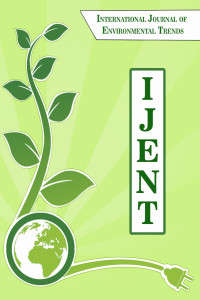Makaleler
Amaç ve Kapsam
Uluslararası Çevresel Eğilimler Dergisi çevre ile ilgili tüm alanlarda hazırlanan orjinal bilimsel çalışmaları yayınlamayı amaç edinmiştir.
Uluslararası Çevresel Eğilimler Dergisi’nin kapsamı nispeten geniş olup mühendislik bilimi alanında orijinal araştırma, derleme ve araştırma notu türü makaleleri içermektedir. Uluslararası Çevresel Eğilimler (IJENT) Dergisi, Ziraat Mühendisliği, Bilgisayar Mühendisliği, Çevre Mühendisliği, Elektrik–Elektronik Mühendisliği, Endüstri Mühendisliği, Gıda Mühendisliği, Harita Mühendisliği, İnşaat Mühendisliği, Jeoloji Mühendisliği, Kimya Mühendisliği, Maden Mühendisliği, Makina Mühendisliği, Mekatronik Mühendisliği, Su Ürünleri Mühendisliği, Mimarlık,Biyoloji, Kimya, Fizik, ve ilgili diğer alanlardaki çevresel yayınlar ile ilgilenmektedir.
Makaleler, çeşitli üniversite ve kurumlarda görev yapan konularında uzman hakemler tarafından değerlendirilmekte ve hakemler tarafından uygun bulunması halinde yayına kabul edilmektedir. Türkçe veya İngilizce makale kabule eden Mühendislik Bilimleri Dergisi, tamamen ücretsiz olup yayınlanan makalelerin tam metinleri de ücretsiz olarak herkesin erişimine açık bulunmaktadır.
Yazım Kuralları
Makale dosyası Microsoft Word (.doc) formatında olmalıdır. Makale Times New Roman veya Palatino Linotype yazı tipi kullanılarak 12 punto ile çift boşlukta yazılmalıdır. Maksimum yirmi (20) sayfa olarak hazırlanmalıdır.
İlk sayfa aşağıdaki gibi organize edilmelidir:
• Yazar isimleri ve adresleri,
• Kâğıdın başlığı,
• E-posta (sadece sorumlu yazar),
• Özet ( en fazla 250 kelime),
Makale içerisindeki başlıklar Giriş, Malzeme ve Yöntem, Sonuç ve Tartışma, Bilgi ve son olarak Referanslar şeklinde sıralanmalıdır.
Referanslar: Ana metinde referanslar (en fazla 40), köşeli parantez içinde rakamlar ile ardışık olarak numaralandırılmalıdır (ör. [1]; [3, 4]; [7-11]). Her referans açıklamasında tüm yazarların isimlerini ve makale detaylarını içermelidir. Kaynakların listesi ana metne uygun ve sıralı olmalıdır.
Dergi yazarları ICMJE (International Committee of Medical Journal Editors) tavsiyeleri ile COPE (Committee on Publication Ethics)’un Editör ve Yazarlar için Uluslararası Standartları dikkate almak zorundadır.
Etik İlkeler ve Yayın Politikası
YAYIN POLİTİKASI
• Dergide çevre ve mhendislik alanında yapılmış orijinal araştırmalar, olgu sunumu, kısa araştırma ve derleme ("Derleme" formatında gönderilecek makalelerde, "İngilizce" dilinde olanlar tercih edilecektir) nitelikli eserler yayınlanır.
• Dergide yayınlanacak eserin daha önce hiçbir yayın organında yayınlanmamış ya da yayın hakkının verilmemiş olması gerekir. Eserin tüm sorumluluğu yazarlara aittir. Dergi editörü eserlerin teknik içerik ve baskı hatalarından sorumlu değildir. Basılmış olan eserlere telif ücreti ödenmez.
• Eserler bildirilmiş olan yazım kurallarına uyularak İngilizce dilinde olması gerekmektedir. Yazım kurallarına uygun hazırlanmayıp sunulan makalelere, 1 defa yazım kurallarını düzeltmesi için uyarı verilir. 2. bir düzeltme hakkı verilmez ve makale "yazım kurallarından "RET" edilir.
• Yazarlar, makaleyi dergiye sunarken "Telif Hakları Bildirim Formu" nu doldurarak sisteme yüklemek zorundadır.
• Editör sürecine dahil edilen makale, alan editörü tarafından hakemleme sürecinden önce bilimsel içerik yönünden değerlendirilip "Ret" / "Kabul" edilebilir. Alan editörü tarafından "Kabul" edilen makaleler ise, incelenmek üzere konu uzmanı en az iki hakemin görüşüne sunulur. Hakem görüşlerinde ayrılık durumunda nihai karar için bir başka hakemin görüşüne ya da alan editörüne başvurulur. Yayınlanmak üzere gönderilen makalelerin dergide yayınlanabilmesi için Yayın Kurulunca bilimsel içerik ve şekil bakımından uygun görülmesi ve hakemler tarafından kabul edilmesi gerekir.
• Gönderilen makaleler, hakemleme sürecine girdikten sonra geri çekilemez ve dergi editör kurulunun izni olmadan başka bir dergiye sunulamaz. Yayının tüm hakları, " Uluslararası Çevresel Eğilimler Dergisi (IJENT)" ya aittir.
Yazarların Etik Sorumlulukları
1. Makaleler gönderici yazarın kendi orijinal çalışması olmak zorundadır.
2. Gönderilen taslak makaleler kesinlikle yayımlanmamış ve daha önce yayımlanmış hiç bir bilgi içermemelidir.
3. Yazar(lar) açısından olası bir çıkar çatışması durumu algılanırsa/tespit edilirse, bu, gönderim işleminden önce taslak makalede mutlaka açıklanmalıdır.
4. Yazar(lar), taslak makalenin hazırlanmasında kullandıkları tüm veri kaynaklarına atıfta bulunmalıdır.
5. Yazar(lar) araştırma sonuçlarını doğru bir şekilde sunmalı ve buldukları sonuçların önemini içeren objektif bir tartışma yapmalıdır.
6. Araştırmada kullanılan veri ve metotların yeterli bir detayla makalede sunulması gerekmektedir ki diğer araştırmacılar bu çalışmayı tekrar edebilsinler.
7. Yazar(lar), istendiği takdirde, verilerin en azından işlenmemiş hallerini derginin hakem ve editörlerine sunmak üzere hazır halde bulundurmalıdır.
8. Özgün olmayan içeriklerin yeniden yayımlanmasına tolerans gösterilmez (örneğin, daha önce başka dilde basılmış bir makalenin İngilizce çevirisi kabul edilemez).
9. Yazar(lar)ın, eğer yayımlandıktan sonra makalelerinde hata(lar) ve eksiklik(ler) bulurlarsa, uygun önlemlerin alınması için en kısa zamanda derginin editörleri ile temasa geçmeleri gerekmektedir.
10. İntihal, veri uydurma ve görüntü manipülasyonu tolere edilmez.
HAYVAN DENEYLERİ YEREL ETİK KURUL ONAYI
15 Şubat 2014 ve 28914 sayılı Resmi Gazetede yayınlanan Hayvan Deneyleri Etik Kurullarının Çalışma Usul Ve Esaslarına Dair Yönetmeliğe (Link: https://www.resmigazete.gov.tr/eskiler/2014/02/20140215-6.htm) göre "Deney hayvanları" üzerinde yapılacak tüm prosedürlerin Hayvan Deneyleri Yerel Etik Kurulu tarafından onaylanmış olması zorunludur.
Sözü edilen yönetmeliğe göre "Deney hayvanı": Prosedürlerde kullanılan, serbest yaşayan veya çoğalan larva biçimleri, canlı kafadanbacaklılar ve normal fetal gelişimlerinin son üçte birlik döneminden itibaren memeliler dahil, insan olmayan herhangi bir omurgalı canlıdır.
Bu nedenle, dergimize yüklenecek olan ve deney hayvanı tanımına uyan organizmalarla yürütülen çalışmaları konu alan makalelerin ön değerlendirmesinde "Hayvan Deneyleri Yerel Etik Kurulu" onayı aranmaktadır. Tüm sorumluluk tamamen yazarlara aittir. Tüm etik izin ve yükümlülüklerin dergiye bilgi verilme yükümlülüğü yazarların sorumluluğundadır.
GİRİŞİMSEL OLMAYAN ARAŞTIRMALAR İÇİN ETİK KURULU ONAYI
5237 sayılı Türk Ceza Kanunu Madde 90, 3359 sayılı Sağlık Hizmetleri Temel Kanunu Ek 10. Madde ve Türkiye’nin taraf olduğu anlaşmalar gereğince insandan anket, mülakat, odak grup çalışması, gözlem, deney, görüşme teknikleri vb. yollarla veri toplanmasını içeren çalışmalar için Girişimsel Olmayan Araştırmalar Etik Kurulu Onayı alınması gerekmektedir.
Bu nedenle, dergimize yüklenecek olan ve insandan veri alınmasını/toplanmasını içeren çalışmaları konu alan makalelerin ön değerlendirmesinde "Girişimsel Olmayan Araştırmalar Etik Kurulu Onayı" aranmaktadır.
AYRICA:
• Dergilerde yayımlanacak makalelerde etik kurul izini ve/veya yasal/özel izin alınmasının gerekip gerekmediği makalede belirtilmiş olmalıdır. Eğer bu izinlerin alınması gerekli ise, izinin hangi kurumdan, hangi tarihte ve hangi karar veya sayı numarası ile alındığı açıkça sunulmalıdır. Çalışma insan ve hayvan deneklerinin kullanımını gerektiriyor ise çalışmanın uluslararası deklerasyon, kılavuz vb. uygun gerçekleştirildiği beyan edilmelidir. Tüm sorumluluk tamamen yazarlara aittir.
Ücret Politikası
IJENT Dergisi açık erişimli bir dergidir ve yazarlardan makale işleme, inceleme ve yayın süreçleri için herhangi bir ücret talep etmez.
Environmental Engineering, Environmental Sustainability and Development, Industrial Waste Issues and Management, Global warming and Climate Change, Environmental Law, Environmental Developments and Legislation, Environmental Protection, Biotechnology and Environment, Fossil Fuels and Renewable Energy, Chemical Engineering, Civil Engineering, Geological Engineering, Mining Engineering, Agriculture Engineering, Biology, Chemistry, Physics,

